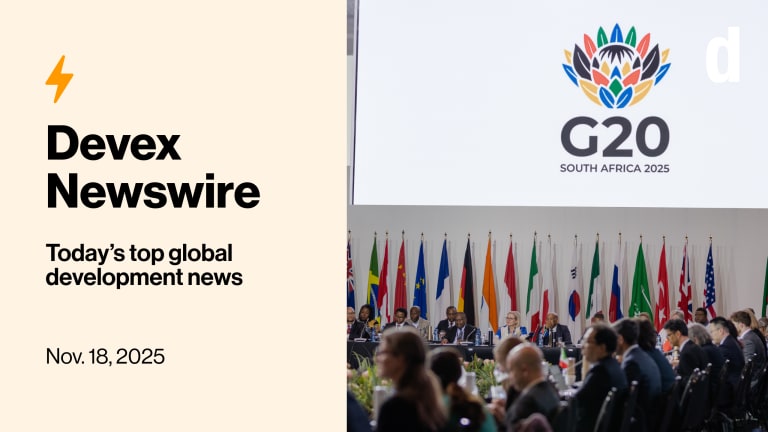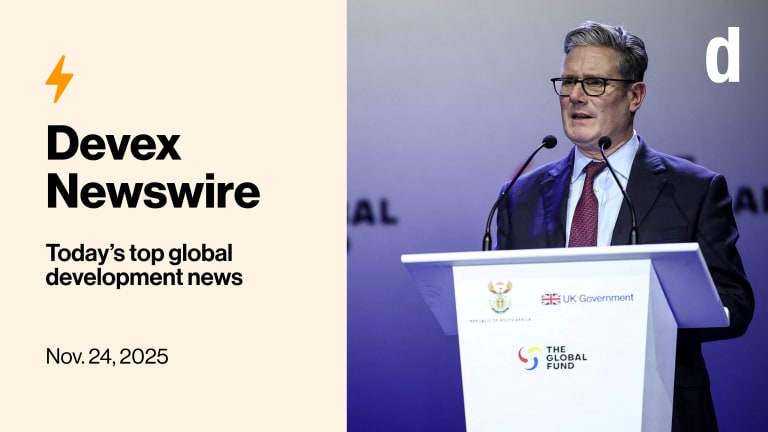
This is a preview of Newswire
Sign up to this newsletter for an inside look at the biggest stories in global development, in your inbox daily.
Only 2% of Africa’s population has received at least one vaccine dose — compared to 40% in Europe. With the global vaccination picture still one of stark inequality, African governments and institutions are looking for options that don’t depend on international donors.
The global COVID-19 vaccination platform that was supposed to help deliver doses to countries around the world — COVAX — ran into a supply breakdown in March. Even without that setback, COVAX was never going to deliver sufficient numbers of vaccines to achieve herd immunity in the countries where it operates.
With a third wave of COVID-19 now hitting lower-income countries harder than the first two, their leaders are looking to build a regional response that can be sustained into the future.
• Sara Jerving reports that the African Union will ship 6 million doses of the Johnson & Johnson one-dose vaccine next week — the first shipment of doses purchased through the African Vaccine Acquisition Trust. This is also the first delivery to stem from a March deal signed by the AU and J&J for 400 million doses manufactured by the South African company Aspen Pharmacare.
• “When we got into trouble this time, it was because there was no production from the African continent. … We won’t solve this permanently through donations. We have to have a sustainable approach to production,” Strive Masiyiwa, special envoy to the AU, said at a press conference Thursday.
• One of the biggest purchasers of these vaccine doses is Tanzania, Sara reports. Under former President John Magufuli, who denied the existence of COVID-19 until his death in March, the government refused to release case count data and remains one of three without a national vaccination program.

Read: The African Union to begin shipment of J&J vaccines next week
Find out more: Tanzania places 'massive' order for COVID-19 vaccines
Health surveillance
Allegations of illegal cell phone infiltration and surveillance by governments using Pegasus, the Israeli spyware, have sent shock waves across the world. In India, among those included in the more than 1,000 potential targets are some of the country’s most prominent public health advocates. Kunal Purohit reports for Devex what the targeting of these experts reveals about India’s health system.
Devex Pro: Pegasus spyware scandal: Why were Indian health advocates targeted?
Top heavy
Philanthropic funding for international human rights hit a record $3.7 billion in 2018 — the most recent year of available data. The catch? That still only amounts to between 2% to 7% of overall global foundation funding, according to a new report from the Human Rights Funders Network and Candid.
Stephanie Beasley reports that the uptick was largely due to increased funding by a handful of U.S.-based foundations, which exert “considerable” influence when it comes to human rights philanthropy. The top 12 funders accounted for 45% of all human rights funding.
Read: Record human rights funding just a sliver of all philanthropic giving
ICYMI
If you missed my colleague Teresa Welsh’s expert discussion on the ethical and operational dilemmas of using foreign aid to address the root causes of migration, check out this recap and recording.
Watch: Can — and should — aid be used to tackle the root causes of migration?
Matters of principle
Last week a foreign affairs official with the Ethiopian government released a statement accusing international aid organizations of delivering supplies to rebel fighters. The New Humanitarian reports that the allegations — especially coming from a government official — threaten to put aid workers in the country at greater risk by undermining their perceived commitment to humanitarian neutrality.
The investigation uncovered many social media posts deriding aid workers as colonizers or “terrorists,” and also taking aim at donor countries, with one tweet showing “a doctored image of USAID chief Samantha Power appearing to brandish an AK-47 rifle.” Twelve aid workers have been killed since Ethiopia’s current conflict began last November.
In other news
China has rejected WHO’s proposal for a second phase of its investigation into the origins of the COVID-19 pandemic, complicating a standoff among WHO, China, and the United States [Washington Post]
G-20 ministers are likely to end talks this week without an ambitious deal on climate change, another setback in the fight against rising temperatures ahead of key negotiations this year. [Bloomberg]
The first humanitarian flight in two months arrived Thursday in Ethiopia's Tigray region, carrying more than 30 aid workers. [Xinhua]
Sign up to Newswire for an inside look at the biggest stories in global development.
Search for articles
Most Read
- 1
- 2
- 3
- 4
- 5








